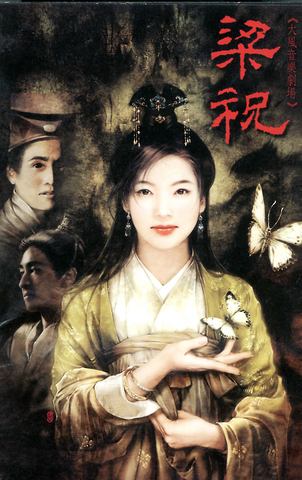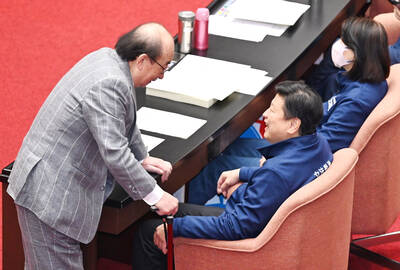The centuries-old Chinese love story of The Butterfly Lovers has been part of folklore for as long as anyone can remember, and has more recently been featured in Chinese traditional operas, on the stage and in movies.
From tomorrow in Taichung, the Dafeng Musical Theater will present this romantic story in a Broadway musical style. The music is composed by the highly-talented Chung Yiu-kwong (
One major and daring change from the original story is the role of Ma Wen-cai (

PHOTO COURTESY OF DAFENG MUSICAL THEATER
The new role that Ma takes in this production is that of a rich, handsome guy who gets almost the same amount of affection from Zhu as Liang does. So, the old story of Zhu breaking away from an arranged marriage turns into a modern triangular love story with leading lady Zhu having to make a final choice of her life-long companion.
Liang is played by Berson Wang (
The Butterfly Lovers is from Oct. 1 to Oct. 2 at Zhongshan Hall, Taichung City; from Oct. 7 to Oct. 8, at Municipal Culture Center, Tainan City; Nov. 4 to Nov. 6, Sun Yat-sen Memorial Hall, Taipei; Nov. 26, Hall of Art, Jungli.
Website: www.liang-zhu.com
Telephone: (02) 2925 3960

On Jan. 17, Beijing announced that it would allow residents of Shanghai and Fujian Province to visit Taiwan. The two sides are still working out the details. President William Lai (賴清德) has been promoting cross-strait tourism, perhaps to soften the People’s Republic of China’s (PRC) attitudes, perhaps as a sop to international and local opinion leaders. Likely the latter, since many observers understand that the twin drivers of cross-strait tourism — the belief that Chinese tourists will bring money into Taiwan, and the belief that tourism will create better relations — are both false. CHINESE TOURISM PIPE DREAM Back in July

Could Taiwan’s democracy be at risk? There is a lot of apocalyptic commentary right now suggesting that this is the case, but it is always a conspiracy by the other guys — our side is firmly on the side of protecting democracy and always has been, unlike them! The situation is nowhere near that bleak — yet. The concern is that the power struggle between the opposition Chinese Nationalist Party (KMT) and their now effectively pan-blue allies the Taiwan People’s Party (TPP) and the ruling Democratic Progressive Party (DPP) intensifies to the point where democratic functions start to break down. Both

Taiwan doesn’t have a lot of railways, but its network has plenty of history. The government-owned entity that last year became the Taiwan Railway Corp (TRC) has been operating trains since 1891. During the 1895-1945 period of Japanese rule, the colonial government made huge investments in rail infrastructure. The northern port city of Keelung was connected to Kaohsiung in the south. New lines appeared in Pingtung, Yilan and the Hualien-Taitung region. Railway enthusiasts exploring Taiwan will find plenty to amuse themselves. Taipei will soon gain its second rail-themed museum. Elsewhere there’s a number of endearing branch lines and rolling-stock collections, some

This was not supposed to be an election year. The local media is billing it as the “2025 great recall era” (2025大罷免時代) or the “2025 great recall wave” (2025大罷免潮), with many now just shortening it to “great recall.” As of this writing the number of campaigns that have submitted the requisite one percent of eligible voters signatures in legislative districts is 51 — 35 targeting Chinese Nationalist Party (KMT) caucus lawmakers and 16 targeting Democratic Progressive Party (DPP) lawmakers. The pan-green side has more as they started earlier. Many recall campaigns are billing themselves as “Winter Bluebirds” after the “Bluebird Action”